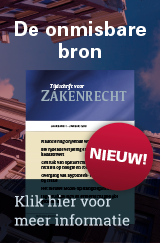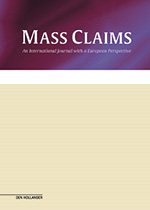Bundling of follow-on damages claims – an efficient way to litigate in the Netherlands?
Mieke Dudok van Heel1 Het artikel is in de opmaak van het tijdschrift rechts als pdf beschikbaar.Private enforcement actions are often brought in the Netherlands as mass claims. Claimants do not – and cannot (yet) – use the procedure for collective actions provided for in the Dutch Code of Civil Procedure since 1 January 2020,1 but bring the claims using the 'assignment model'. A special purpose vehicle (litigation or claim vehicle), usually financed by professional litigation funders, 'collects' claims – sometimes thousands – from numerous injured parties – usually substantial companies in their own right – throughout Europe, or even beyond, and brings these 'bundled' claims before the court in its own name.
Follow-on cartel damages actions, also when they are brought as an individual claim, or more claims by one national group of companies, entail interesting and sometimes difficult legal issues. These include limitation periods, joint and several liability, disclosure of evidence (information asymmetry), quantification of damages, indirect purchasers, passing-on, and umbrella damages. These issues multiply when multiple claims are bundled. It is self-evident that the sheer multitude of claims from companies in various (European) countries presents challenges for the judiciary and the parties. It raises additional issues, not only of substantive but also of procedural law. The bundling of claims is envisaged by the Damages Directive2 as an efficient method for the recovery of damages. It may indeed seem an efficient – and possibly the only economically realistic – manner for injured parties to obtain damages, as bundling is often the only way "to attain the critical mass required to merit enforcement activities".3
Yet, as a result of the bundling, the proceedings do not necessarily become more efficient (to put it mildly), especially as this concerns uncharted waters. As Advocate-General Drijber phrased it in an article: "The larger cartel damages proceedings in the Dutch courts (Air Cargo, Cathode Tubes and Trucks) seem to plod along from one interim judgment to the other. (…) This is, however, inevitable because it concerns new matter and the claimants are playing for high stakes. This in turn provokes the defendants to put forward a whole range of defences)".4 The assignment model is – or was until recently – an unknown phenomenon in Dutch law. A litigation vehicle as such is not attributed any special status under Dutch procedural law and the litigation vehicle's claims are nothing more than the collected claims of each of the injured parties that have assigned their claims to the vehicle. Therefore each injured party (e.g. the purchaser of the trucks) must still – as if it had initiated the action itself – prove it has suffered harm as a result of the infringement. And as the courts have ruled consistently, claims brought by a litigation vehicle must be substantiated accordingly. This, does not mean though that all litigation vehicles do so.5 In addition, in all cases a battle royal also takes place about the validity of the assignments: to what extent must the litigation vehicle produce evidence of the assignments? Hopefully, in due course the Supreme Court will put an end to that battle. On 5 April 2024, the Advocate-General rendered his opinion in Air Cargo on just this issue.6 Under Dutch law, the debate whether the assignment model as such is admissible seems to have died out. In the Supreme Court appeal in Air Cargo, no grounds challenging the judgment of the courts in this respect were filed. In Germany, however, the Landgericht in Dortmund, on 20 April 2023, submitted a request to the European Court of Justice for a preliminary ruling on this matter.7
Last but not least I should mention governing law. Obviously, when claims of injured parties based in various countries are bundled (or worse: of injured parties that fly air cargo all over the globe), the question which national law governs the claim for damages arises. Fortunately, at long last also this question will be answered by the Supreme Court in due course. In line with the judgments of the lower courts, the Advocate-General in both the Air Cargo and the Trucks cases8 is of the opinion that it should be Dutch law for all claims, wherever the truck(s) were purchased or whatever the route was the air cargo travelled.
As a result of all the preliminary skirmishes, in Air Cargo, after 14 years, only now have we finally reached the heart of the matter: the quantification of damages. In Trucks, seven years after the first claims were filed, we yet have to reach that stage. Which begs the somewhat rhetorical question: is this efficient?
To end on a positive note: for lawyers it is interesting and challenging work. We are all pioneers. As a judge, one must not only possess a good legal brain, but also project management skills. It is one of the few fields of law where national judges in Europe must apply – to a large extent – the same law and are bound by the judgments of the European Court of Justice. As national judges we are connected in the Association of European Competition Law Judges (AECLJ).9 At our meetings we share ideas and insights. And we learn from one another.
This Mass Claims Journal is another truly international initiative and a good source of information for all lawyers around the world – in the judiciary and private practice alike – who are handling mass claims of all sorts, including follow-on damages claims.


